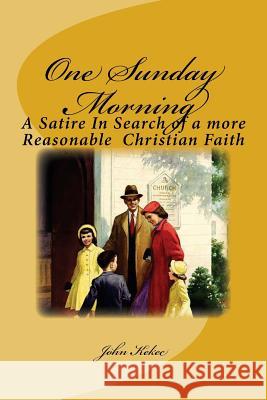One Sunday Morning: A Satire in Search of a Reasonable Christian Faith » książka
One Sunday Morning: A Satire in Search of a Reasonable Christian Faith
ISBN-13: 9781517484705 / Angielski / Miękka / 2015 / 196 str.
It's conventional to believe that there is a seed planted in all humankind prompting the seeking out of a deity. Therefore, although religion may not be in the forefront of people's lives, it is certainly somewhere in the background or around the corner in everyone's life, and for this reason these pages have relevance. But to better understand the contemporary church and the Christian faith that it represents, it is necessary to first look at the past, study the biblical and extra-biblical evidence, and be willing to venture out beyond the comfort zone of accumulated church orthodoxy to critically examine this faith. The church has been revered through the centuries and embodies the grandest hopes that our hearts cling to. The church's effigy is prestigious with bell towers chiming the reverence and organs resounding the sanctity. So ageless, immutable, and perpetually the church perseveres; an edifice on high ground ensconced and securely sheltered behind its doctrines, creeds, and saints; settled snuggly behind the stained glass on its pious pedestal, an awe-inspiring passing image revered by most through a lifetime of reverent glances. Perish the thought however that the church would function only as a church family social organization, or that the extent of any church worship service would consist only of such things as an ego-boosting vehicle of fashion or for uplifting spirits, prepared musical and impressive individual prayer performances, or a stage from which to strut a pulpit performance or other prepared production. The church pedestal however, on which rests the Christian faith's higher ideals, esteem, and respect, seems to have been markedly lowered from what it once was. We seem to be becoming a worldlier and more secular nation less bound by good morals and religious principles. This is due in part by the external societal changes, but also the internal causes within the church. These pages look for some of the reasons why. One Sunday morning after going to church I finally got around to asking myself, "What's wrong here; what's wrong with my Christian faith? What parts of it do I really accept with conviction? It is probably certain that we can never know the exact nature of our Christian faith, but probably just as certain is the fact that we can and should know the facts better than what has been disseminated by the church, and this is not acceptable. In addition, and even with the best of intentions, many eager evangelistic motivated church leaders use an emotional presentation while quoting scripture out of context and finding imaginary secondary meanings for it to make their point. This type of exorbitant fast and loose use of the scripture over time also lessens the credibility of the faith. Through remedial satire and dramatic monologue expression, this book holds a mirror up reflecting this less acceptable image of the past and present Christian experience. It should be emphasized that reverence to God and Christ Jesus are held to be preeminent and above reproach, and this remedial satirical quest is not about Christ Jesus' actual Christology. It is however about some of the church's adopted dogma, practices, and methods, its rather sordid early historic record, and the serving of its own self-interests at the expense of the integrity of the authentic Christology of the Christian faith, the primary reason for its existence. The book takes us in search of a more reasonable, tolerant, and responsible Christian faith that affords more integrity and conviction. Although not presumed as providing conclusive answers or as a critique on the Christian Church orthodoxy, it is intended to provoke thought, engender tolerance and a well-earned sense of humility, and perhaps even reason enough for re-examining our faith. To say that God is still working on us and that we have not quite yet reached any desired state of perfection would be a gross understatement, as the drama illustrates in exaggerated fas
Zawartość książki może nie spełniać oczekiwań – reklamacje nie obejmują treści, która mogła nie być redakcyjnie ani merytorycznie opracowana.











